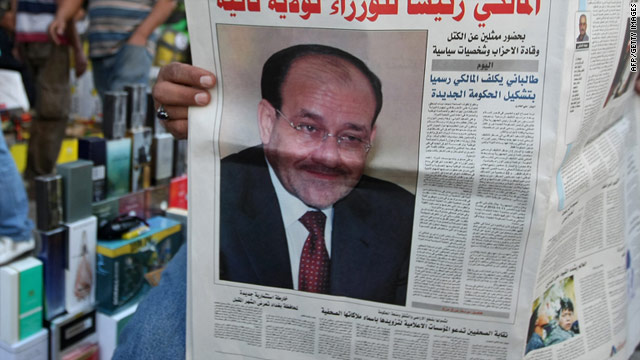Scammer
Banned

Nuri al-Maliki is scheduled to present some key members of the Cabinet to parliament when it convenes Monday
Baghdad -- Iraqi politicians offered different opinions Monday over when Prime Minister Nuri al-Maliki would make the long-awaited announcement of the country's new government.
The incumbent prime minister is scheduled to present some key members of the Cabinet to parliament when it convenes Monday.
Hasan al-Sneid, a member of al-Maliki's bloc, said the government would still take place, but had been postponed until later in the day.
But lawmaker Mahmood Othman said the country's political limbo, which started after no bloc won enough seats to create a governing coalition in the March 7 elections, could last a few days longer. It will be "at least" Wednesday before the Cabinet is presented, he said.
And members of other blocs also said no final agreement on nominations had been reached.
Al-Maliki has until this weekend to unveil his Cabinet before a constitutionally set deadline to form a government runs out.
The government lineup, according to senior politicians, will be missing the three posts of security ministers (interior, defense and national security) who would control the country's army and police.
Politicians say more time is needed to nominate candidates for these sensitive posts.
But Amir al-Kinani, a member of parliament from radical Shiite cleric Muqtada al-Sadr's bloc, said the bloc would refuse to vote Monday on an incomplete government.
On Sunday former Prime Minister Ayad Allawi indicated that he would take part in the new Iraqi Cabinet that his rival, incumbent al-Maliki, planned to present -- ending weeks of uncertainty about whether he would participate.
Last month, Allawi walked out of parliament and declared power-sharing dead.
But he later said in a statement that his al-Iraqiya bloc "will play our role actively, productively and cooperatively, and in a spirit of good faith and trust-building, as long as we find that this spirit is echoed and reciprocated by our partners in the political process."
Still, his cooperation and participation depend on other parties' respecting the power-sharing agreement -- a reality that remains uncertain, due to deep-seated mistrust between Iraq's political groups.
In the March 7 elections, Allawi's bloc won 91 seats, the largest number for any group, and al-Maliki's list trailed with 89.
But al-Maliki, who received the backing of the followers of anti-American radical cleric Muqtada al-Sadr and eventually the kurds, managed to secure a second term.
A fragile, U.S.-brokered power-sharing deal forged last month between the major blocs signaled a possible end to the political squabbling. The deal mandates the creation of a National Council for Higher Policies -- a body designed mainly to appease Allawi and other critics who accuse al-Maliki of abusing his powers.
"The aim of this council is not to weaken or undermine the executive, legislative or judiciary authorities, but rather to strengthen them by playing the role of a guarantor to push the agreed-upon programs and reforms in areas of higher policies; working to achieve political agreement; and as a vital institution to exercise true national partnership," Allawi said.
His confirmation of heading the council and parliament's lifting of a political ban Saturday on three politicians allied with him removed two major hurdles and signaled an imminent government announcement.
Allawi's bloc is Sunni-backed and the inclusion of Sunni Arabs in the government has been important for the stability of the security situation.
Many officials, including Allawi, have warned that the exclusion of the Sunnis or any other major group could lead to renewed sectarian violence.
